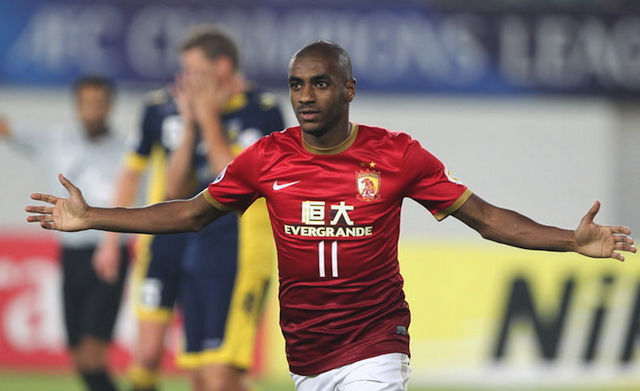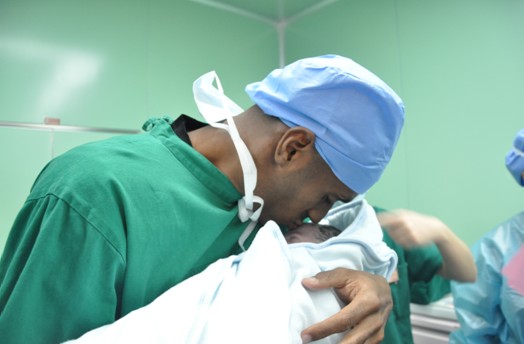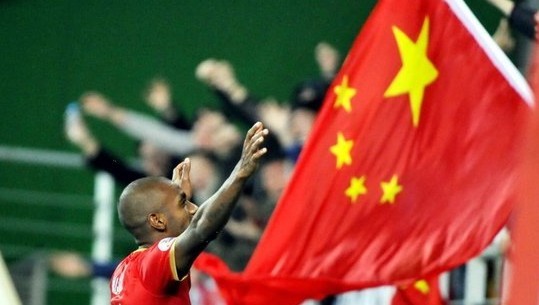Wild East Football editor Christopher Atkins had the opportunity last week to speak with Guangzhou Evergrande forward Muriqui on behalf of Sohu Sports.
The interview was published in Chinese on Wednesday morning, but can bring you the English transcript of the conversation in which Muriqui discusses his Asian Champions League successes, Elkeson’s arrival, raising a child in China and, even, when he plans to return to Brazil.
You won your Champions League game against Central Coast Mariners this week and have been playing very well in the competition this year. Why do you think you have been so successful in this competition?
I am doing my job. Last year, I had my first opportunity to play in this competition, and it was a great learning experience for our team. This year we are all more experienced. We now know the competition better than last year, when everything was all new to us. I consider myself more experienced and I already know more about the other teams. I think this has helped me.
What is the expectation for the rest of the competition, for you and the side?
I always put the team first. I want to be champion, which is the main objective of our team. We are through the first two stages and now it begins to get tougher, with only eight teams left. We have the possibility to become champions. We are going to fight for this title and, if I can be top scorer, I will be very happy because it will crown my participation in this competition.
You have scored more goals in the Champions League than in the Chinese Super League this season. Has the arrival of Elkeson changed your role in league games?
Elkeson hasn’t played in the Champions League, because only three foreigners can play. In the league, he is playing. I think every player is here to help as they have quality. Our team has four foreigners with high quality and that makes it easier for us. I don’t know if they will switch one of the foreign players in the Champions League, but I know he has helped us a lot—just like the other foreigners.
And do you think because he is Brazilian it has helped you build a relationship and an understanding?
I think that when he arrived we had four Brazilians like last year, which is always good. But this year we have two Brazilians and two Argentines, so it has changed a little. But, regardless of that, the relationship is good and everyone is respected. I think that is the most important thing. On the pitch, we look to help each other in order to get the result. Thanks to God, the results have come and this shows that our spirit is good.
Elkeson has adapted quickly after arriving in China. How have you helped him and what is the most difficult thing for Brazilians coming to China?
I haven’t helped much, because it’s a very relaxed and welcoming place. There are many restaurants. The only problem he has faced is the language—communication. Other than that, there are good restaurants, good places for shopping and plenty of leisure time. I think that helps a lot with adapting. I think he has earned all his success, because he has managed to adapt. He had the will power to overcome his obstacles, and to succeed on the pitch. I think that is the most important thing. The most challenging thing, I think, is the language. It’s the biggest obstacle because it is totally different to what we are used to. There is no way to understand something. I’ve been here three years and I now understand a few words, but I cannot speak normally. I don’t really speak any at all. I understand some words, but I think language is the biggest challenge.
You recently became a father. Did you think of returning to Brazil when you heard the news? Or were you always happy to raise your son in China?
Firstly, I have three more years on my contract. But, it’s very good to raise a child here, and my son will have the opportunity to learn two or three languages. There are good schools, and that is before even considering safety. Of course you always want to go back to Brazil, and always think of returning to Brazil. However, I am very relaxed and very happy here, so I am not thinking of returning at the moment. In the future, in one or two years time, who knows? But, for now, I am comfortable and don’t plan to go back soon.
You were in the media recently regarding the possibility of playing for the China national team. What’s the story behind those interviews? Was it just a question, or have you thought about changing nationality to play for China?
This is speculation. I gave an interview to a TV channel here in China and the reporter asked me if I had considered changing nationality. I said that if a proposal came, I could think about it and see if I would lose my rights in Brazil. There is nothing more than this. My position remains the same. It’s difficult, because this has never happened and there is no precedent of changing nationality for players in any other sport so I don’t think it will happen. I’m relaxed about it. If one day there is an opportunity, I’m calm. If it doesn’t come, I will continue to do my work well and live my life normally.
And if it were offered, would you accept it?
I would need to look at my rights, as China does not accept dual nationality. You are either Chinese or Brazilian, so I would need to look at my rights in Brazil and see what I would lose, or not lose, in order to be more certain. As there is no progress on this situation of naturalisation, I never thought about whether I am interested. I am not worried. If one day I am still here and it is possible then that’s fine. If not, then life will go on normally.
You are now 26 years old. Where do you see yourself in five years time? Do you plan to stay in China? Would you like to go to Europe? Or, even, return to Brazil?
It will be difficult to play in Europe because I will soon turn 27. As I am playing in China, it is difficult because there is not enough visibility for a player of my age. If I were 23 or 24, that would be another matter but, now, I am almost 27 and it will be difficult to play in Europe. I made a plan for my life that I will return to Brazil when I turn 30. I still have three years, so we will see what happens. If all goes well, I will return to Brazil from here in three years. I don’t know what will happen in this time, but my thoughts are to return to Brazil at 30 years old.
Has Chinese football improved since you arrived?
It has improved a lot. I think some things need to change, but it has developed a lot since I arrived three years ago.
Last year, Marcello Lippi arrived as the coach of Guangzhou Evergrande. He recently described you as the best player in Asia, how did you feel to receive the praise of such a respected coach?
I was happy for the recognition of my work, but it only serves as motivation to continue to look for success. Football is very dynamic and many things change from one day to the next. Today I am playing, but tomorrow I could already not be playing any more. Thus, it serves as a motivation to keep up my work and concentration levels during the game, in order to keep improving. I was happy, very happy, to be acknowledged by a coach who has won both the World Cup and Champions League, but it is motivation for me to become even better both as a player and as a professional.
Lippi came in last year to replace Korean coach Lee Jang-Soo, who had been doing a good job. What changes have been made since he arrived?
They are differing styles—the Korean school and the Italian school. Our formation is basically the same, a 4-2-3-1, but we have a bit more freedom now. Coach Lee was a disciplinarian, who emphasised the discipline and marking of our team. With Lippi we play more than under Lee. With Lee we marked more, but also had to keep the ball and try to play. They are different schools of thought. There is not a lot to compare, you cannot make a comparison between the two.
With the arrival of Elkeson, there have been four foreign players competing for three places in the side. You have been replaced several times in the Super League. Are you happy to play a rotating role?
It’s clear that every player wants to play. As I said to you: one minute you are the best, and the next minute you are not playing. Thus, I try to do my job well. If I leave the pitch or not, it is the coach’s decision. I always want to play, always want to be involved, but things don’t always work out as you had hoped. I respect that the coach makes the decisions that he has to make, but I continue working so I don’t need to be substituted during games. I am relaxed in this respect, it is his decision whether to call upon me or remove me. He makes substitutions according to what he wants and what he thinks at that moment. I need to work and stay calm so I won’t be substituted any more in matches.
It has been commented to me that Evergrande’s right-back Zhang Linpeng plays in a very Brazilian style. Do you agree?
He is truly a good player. He is still young, around 22 or 23 years old—I do not remember exactly how old he is—but he is a good player. In reality, he is a centre-back. However, since the coach plays with a formation using a “false centre-back” playing on the right, he helps a lot. He has a lot of physical strength, and really helps the team. He is a guy who, in my opinion, has everything needed to play in Europe. He has good physical strength, good technical quality and would do very well in Europe.
Your fellow forward Gao Lin has also been in good form, and many say that he too could play in Europe. What do you think?
Gao Lin is also a very good player. He is a centre-forward who can also play on the wing, depending on the opponent. He is a someone who finishes well and has good speed. I do think he’d do well in Europe, yes. There are players like him who play in Europe, with a similar style. I believe that if he were to have the chance, he would do well in Europe also.
Finally, having been in China for three years now, you will have an understanding of the game here and the country. Which is the most difficult team to face? And, which side do you most enjoy facing? Also, outside of football, where has been your favourite place in China?
I think that the worst team to play against is Beijing. Beijing Guoan are always our rivals throughout the season. When we play in their home ground it’s very difficult, and it’s also extremely difficult when they play here. I think Beijing are the hardest team to beat, but it’s also the team I most enjoy playing against. The place I most enjoyed playing I think has been Shanghai, who have a beautiful stadium, and it is also a good place to walk around and get to know. I think that Shanghai is a pretty cool place to be based and to play also. Whenever we have a break, I go to a nearby beach resort called Sanya. It’s a beautiful beach with fantastic hotels. Whenever we have two or three days off, I try to go there to relax.




Great interview, good work Mr Atkins.
Bravo!